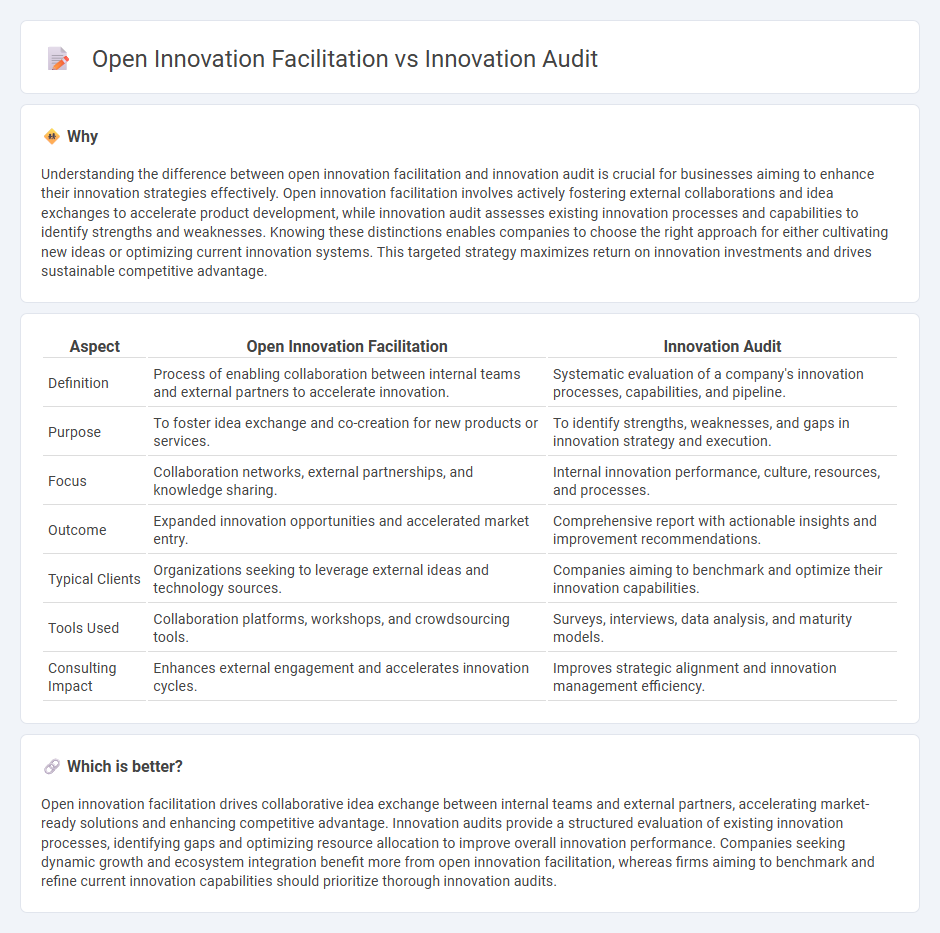
Open innovation facilitation drives collaborative idea exchange between organizations and external partners to accelerate technology development and market reach. An innovation audit systematically evaluates internal processes and capabilities to identify strengths, weaknesses, and opportunities for strategic growth. Explore how combining open innovation facilitation with innovation audits can optimize your company's innovation pipeline and competitive advantage.
Why it is important
Understanding the difference between open innovation facilitation and innovation audit is crucial for businesses aiming to enhance their innovation strategies effectively. Open innovation facilitation involves actively fostering external collaborations and idea exchanges to accelerate product development, while innovation audit assesses existing innovation processes and capabilities to identify strengths and weaknesses. Knowing these distinctions enables companies to choose the right approach for either cultivating new ideas or optimizing current innovation systems. This targeted strategy maximizes return on innovation investments and drives sustainable competitive advantage.
Comparison Table
| Aspect | Open Innovation Facilitation | Innovation Audit |
|---|---|---|
| Definition | Process of enabling collaboration between internal teams and external partners to accelerate innovation. | Systematic evaluation of a company's innovation processes, capabilities, and pipeline. |
| Purpose | To foster idea exchange and co-creation for new products or services. | To identify strengths, weaknesses, and gaps in innovation strategy and execution. |
| Focus | Collaboration networks, external partnerships, and knowledge sharing. | Internal innovation performance, culture, resources, and processes. |
| Outcome | Expanded innovation opportunities and accelerated market entry. | Comprehensive report with actionable insights and improvement recommendations. |
| Typical Clients | Organizations seeking to leverage external ideas and technology sources. | Companies aiming to benchmark and optimize their innovation capabilities. |
| Tools Used | Collaboration platforms, workshops, and crowdsourcing tools. | Surveys, interviews, data analysis, and maturity models. |
| Consulting Impact | Enhances external engagement and accelerates innovation cycles. | Improves strategic alignment and innovation management efficiency. |
Which is better?
Open innovation facilitation drives collaborative idea exchange between internal teams and external partners, accelerating market-ready solutions and enhancing competitive advantage. Innovation audits provide a structured evaluation of existing innovation processes, identifying gaps and optimizing resource allocation to improve overall innovation performance. Companies seeking dynamic growth and ecosystem integration benefit more from open innovation facilitation, whereas firms aiming to benchmark and refine current innovation capabilities should prioritize thorough innovation audits.
Connection
Open innovation facilitation accelerates collaborative idea sharing between internal teams and external partners, cultivating a dynamic ecosystem for breakthrough solutions. Innovation audits systematically evaluate a company's innovation processes, identifying strengths and gaps that inform targeted open innovation strategies. Together, these practices enhance organizational agility by aligning external collaboration with internal capabilities, driving sustainable competitive advantage.
Key Terms
**Innovation Audit:**
An innovation audit systematically evaluates a company's innovation capabilities, processes, and outcomes to identify strengths and areas for improvement, ensuring alignment with strategic goals. It involves analyzing factors such as R&D efficiency, idea generation, project management, and market impact to enhance overall innovation performance. Explore how innovation audits can transform your organization's innovation strategy and drive sustainable growth.
Capability Assessment
Innovation audits evaluate an organization's current innovation capabilities, identifying strengths and gaps across processes, technology, and culture to guide strategic improvements. Open innovation facilitation emphasizes leveraging external knowledge and partnerships to enhance these capabilities through collaborative ideation and co-creation. Dive deeper into effective capability assessment techniques to maximize innovation performance.
Gap Analysis
Innovation audit systematically evaluates a company's internal processes, resources, and capabilities to identify areas of underperformance or inefficiency, using tools like SWOT analysis and benchmarking to uncover innovation gaps. In contrast, open innovation facilitation emphasizes bridging these gaps by leveraging external ideas and collaborations, fostering partnerships with startups, research institutions, and industry experts to accelerate knowledge transfer and co-creation. Explore how integrating these approaches can enhance innovation outcomes and address critical gaps in your organization's strategy.
Source and External Links
Innovation Audit: A Guide for Assessing Organizational Innovation - An innovation audit is a systematic assessment of an organization's capacity for innovation, evaluating processes, culture, strategy, and resources to identify strengths, weaknesses, and opportunities for improvement.
How to assess your company's level of innovation - An innovation audit helps understand how an organization manages innovation by reviewing strategy, culture, resource allocation, and business modeling to avoid wasting resources and guide effective innovation efforts.
Innovation Audit - Cranfield School of Management - This audit assesses innovation effectiveness using the Pentathlon Framework, which covers innovation outputs and five management aspects: strategy, idea generation, prioritization, implementation, and culture.
 dowidth.com
dowidth.com